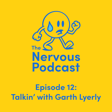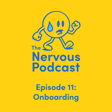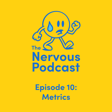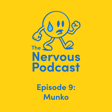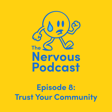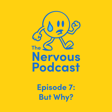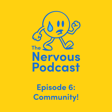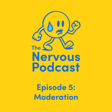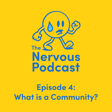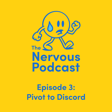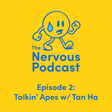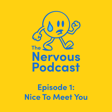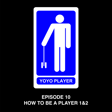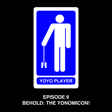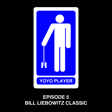Become a Creator today!Start creating today - Share your story with the world!
Start for free
00:00:00
00:00:01

Talkin' With Adriana Angelini
Dylan and Steve chat with Discord Partner Manager Adriana Angelini about the power of community and how Discord makes it better.
Recommended
Transcript
Introduction and Podcast Philosophy
00:00:00
Speaker
Hi, I'm Dylan. And I'm Steve. And I'm Adriana. And we are nervous.
00:00:34
Speaker
That's our favorite thing to do. We like to not warn people about our intro and then just jump into it and see see how they do. How did I do? Did my energy match the vibes?
00:00:44
Speaker
I think so. I think so, yeah. weve weve I think you have like a middle of the road pause. We've had a couple where I feel like they just stared at us for way too long. But that's why we have editors, right?
Meet Adriana: A Journey from Fashion to Tech
00:00:58
Speaker
So everyone, um I'd like to introduce you to Adriana. um I've known Adriana for a couple years now. We've worked on a bunch of projects or at least a couple projects, some projects.
00:01:08
Speaker
on discord for various companies and brands and we thought it'd be interesting to bring her on to the nervous podcast to. Can i just talk over community and and see what what she has to say so adriana tell us about yourself please.
00:01:23
Speaker
Thank you so much for having me. ah My name is Adriana. I am a strategic partner manager on the global partnerships team at Discord, which means I help a lot of partners build and cultivate really, really beautiful, magical communities on the platform and I guess I got into this role from my previous role which was also in community community management. um I was working at a very very small boutique sort of tech marketing firm and my role there also as a um partner manager was in helping brands kind of find their fans
00:02:09
Speaker
it's actually really cool so what we were doing was for example me let's say i love zara um and one of our partners was zara so we would help zara find people like me not an influencer that has a million followers or 200 000 followers it's you know Adriana, who has 100 followers on Instagram, but it's true friends of mine that I would then be sharing. My love for Zara and Zara would give me products to try on and talk about that with my friends. So that was actually a really cool company that was really connecting brands to their genuine fandoms and then working with them on really cool activations.
00:02:50
Speaker
And before that, i was I actually studied fashion design and i had my I got my degree in fashion design, quickly learned that I have no dexterity or skills with my hands. So pivoted to fashion marketing, which is kind of what got me into the world of agencies and creative work and, yeah, communities. So that's a little bit about me and my background.
00:03:14
Speaker
I feel like we almost need to just pause the podcast here. This is no longer about community. This is about fashion school because that is fascinating to me. Yeah. Also, um, I was just too nice for that industry. I just, it ate me and spat it. what What's that idiom? It ate me and spat me out alive or, you It ate you up and you drew up and spit you out. That is one thing I'll say as much as I think tech and working with brands can be like stressful and a lot. It is nothing compared to like fashion or health care or those kind of industries where
00:04:01
Speaker
The expectations are way up here that you're on all the time. and You have to be constantly thinking about it. When you're working with a community, usually you have a team that helps kind of make things happen. So it's not just all on you.
00:04:15
Speaker
I did not know that about you, Adriana. That's fascinating. Yeah. um You know, to that point, actually, it's very interesting because I think the strongest kind of fandoms and communities out there are around like fashion brands and fashion houses. So, yeah, I mean, the the sense of community that you do find in the fashion industry, I think, is really fascinating. And we could probably have a whole hour segment on that alone. But But yes, that is my my background.
00:04:49
Speaker
So, so what would
Building and Thriving in Communities
00:04:50
Speaker
you say? So I don't know anything about like online fashion communities. I mean, my, my community background is largely centered around like toys and toy industry type stuff, Yoya specifically, but also just a lot of like entertainment properties. So like, I don't, I don't really participate in, in any kind of online like fashion community. Like tell me, tell me what those communities are like.
00:05:16
Speaker
Yeah, I think and I think there's like so much that happens I think and in fashion communities and there's kind of value and purpose that you can find and even different verticals of them within the fashion space. But I think first and foremost, the common denominator that I see in those types of community is just inspiration. And it's about personal expression and just kind of letting others into your kind of world of one single piece and the different ways that you can style it. And then the kind of different rabbit holes that spring from people's different style. So it's like, you know, this one mini skirt, how can you make it look really punk? and Or how can you make it look very classic? And how, you know, how do you style it with other pieces from Zara to make it a very affordable look versus how do you style it with like a beautiful Valentino sweater that then gives you this sort of high-low
00:06:14
Speaker
um you know look and so I think inspiration is at the root of a lot of these fashion communities but then so more on my background actually um after college I started a business with a friend of mine and we were we really dove into this idea that luxury luxury items could be investments. So when you think of Hermes and they have the Birkin bag that sells for $12,000, I think now it's at $15,000, whatever.
00:06:49
Speaker
It's this idea that these women that have these Birkin bags, because they're so hard to get, they could resell them in sort of the secondhand market and actually make money off of that resell. And so we were having a lot of fun with yeah just that idea of um of secondhand selling and the reason I bring up that story is because in the fashion industry there's tons of these reselling communities as well of like Chanel lovers that are all part of these groups where they just sort of exchange their different Chanel handbags and resell them and so you have these sort of fanatic women that are looking for
00:07:33
Speaker
that Chanel piece that came out in the spring of 2013 that you can no longer buy in store, but you can access and buy through another woman in these sort of handbag clubs, which I find really cool. Wow. So is super similar so with that with these kind of like reseller communities, are they very like brand specific or more like item specific? Like this is a community for shoes, this is a community for handbags. Yeah, I mean, I do think you find um all of those. um I have found them brand specific or the ones specifically like reselling, you will find a lot of them. It's like Chanel and then you find them reselling Chanel shoes, belts, you know, handbags, pieces of clothing. um But for a lot of these design houses, I think um handbags is a big
00:08:27
Speaker
Um, I, fetish isn't the right word, but women love their handbags. We don't, we don't think came here. So we can call it a fetish. So now where do you come down on the, um, bag with designer logos on it? Are you, are you pro logos all over or are you more like stealth?
00:08:49
Speaker
yes i oh my god that's so funny i am definitely more stealth um not that i you know love a good logo but for me my personal style i do like to be a little more more stealth and i don't know if you've heard of the word or the term but it's called quiet luxury and so it's this idea that yeah it's a designer it's kind of like only the very very very rich will know about that piece not because of its logo but because yeah it's like they know that it's expensive because they know it's expensive not because of the logo so yeah again very very elitist um not saying i like
00:09:33
Speaker
ah necessarily agree with it but yes I'm more of the quiet luxury approach which is funny because while we're really getting into a rabbit hole here but I was talking about this with my friend where we ah when you look at the fashion industry today and I'm talking fast fashion I'm actually even like high-end designers well anyways It really is about, it's not looking at the label in terms of like, does it have the Valentino or Chanel you know logo? It's actually about looking at the materials because you could buy a $3,000 Chanel jacket, but if you look at what it's made of and it's 80% polyester and 20% acetate or whatever, you're literally spending $3,000 on plastic.
00:10:25
Speaker
And so to me, it really even is less about the logo and more about the material of the item. So I would rather spend $200, even if it doesn't have a logo on a 100% leather bag, than I would spending $500 on you know a bag that's that's plastic. So my version of looking at logos is what is the the garment or the piece actually made of and just kind of focusing on natural. I don't know if natural is the word, but yeah, just like good, good materials. As somebody who has spent six, $700 on titanium yoyos, I fully and completely understand this. it I'm glad it resonated. And as someone who regularly spends hundreds of dollars on plastic to build little miniatures, I kind of feel called out a little bit.
00:11:20
Speaker
Don't worry, I have, you know, I have plasticking in my closet too. I'm not, it's it's there unfortunately, but but yeah. That is that is fantastic. um So with these reseller communities, is this something that's always like fully independent of the brands or is this the kind of thing where like the brands will actually have their own like reseller component within their online communities? Oh no.
00:11:47
Speaker
Absolutely not. the the The brands do not want to be involved in the reselling. the the brand This is very fandom run, not hidden, but yes, the brands have nothing to do with this because you know they they want you to buy the newest thing off of their store.
00:12:08
Speaker
not goingnna Promote and especially especially I mean we're talking about this but like Hermes with the Birkin bags that sell for so much like they they need to protect that bag at all costs like they want people to fight for it they want they want women or whoever's purchasing the bag to play hard to get. And these resell communities make it easy. I mean, easy if you have the money, but easy to get these bags faster. So yeah, if the brands had a say in it, they would be they would shut down these. It's similar.
00:12:43
Speaker
It's similar to um like video games, how you know the reason GameStop existed was to, or maybe still exists, is to allow people to sell their games they're no longer using to other people. So they'd sell them to GameStop, GameStop would resell them, and the game publishers hated it. They still do.
00:13:03
Speaker
Yeah, which is interesting when you think about community because you know you you kind of want to challenge the brand and and think, or you challenge the brand to say,
00:13:17
Speaker
How valuable would these this group of women really be for your brand if you actually leaned into it and started creating an authentic relationship with these women that are showing their undying loyalty to you? like What could you unlock as a brand if you started to tap into that and yeah to
Beyond Sales: Cultivating Genuine Brand Communities
00:13:37
Speaker
build these authentic relationships with these women? I think it's a really, I mean, honestly, it's a really telling example of how brands um how brands only view the sale as the most important thing that they can get from the community. You know what I mean? like they they they want to They're willing to invest in the community if the community is is directly tied to sales, right? Whereas if it's all secondhand stuff, the brand is is financially not benefiting from that, but it's building the reputation in a way that their direct sales can't.
00:14:15
Speaker
I love that so much. Yeah. And that's the missed opportunity, right? Because when you're only looking at sales, you kind of take the the human emotion on maybe even like out of it which is where you lose on engagement and then if you lose on engagement you're losing on sales because engagement and sales are I think directly correlated with one another because if I'm about to spend my money I'm thinking through the emotions of how did this brand make me feel
00:14:49
Speaker
you know how they sent me this beautiful engraved letter just thanking me for my business. I want to shop with them again. Or they invited me to this really beautiful rooftop New York party. I don't know if that happens, but it never happened to me. but you know And I want to reinvest my money into them because I feel like they care about me. And I think a lot of brands miss that in in those authentic relationships that then end up leading to major sales.
00:15:18
Speaker
I think it falls into the purchasing on Etsy. If they just stuff the stuff in a box and it shows up, you're like, cool. Thanks for the stuff. Never shopping there again. But if they include like a custom packaging or a sticker or something like that, you're like, well, hot damn, I'm gonna, I'm going to shop there again. I don't know when I'm going to need that, but definitely on the list. I think that's what a lot of like the big major brands miss out on is there. They always talk surprise and delight, but they don't actually.
00:15:47
Speaker
A, it's never a surprise and it's rarely delightful. You know, it's like join our super secret club and we will give you one dollar for every thousand dollars you spend. You know, and no one really cares.
00:15:59
Speaker
Yeah, and that's honestly what's so tough with communities. it It's that like validating that your effort put equals sales or whatever your KPI is, because it's hard to tell the CEO of a company, like we have good vibes. You know, the CEO is going to say, okay, well, good, have a good vibes helping my bottom line. And so I think for community managers, it's really trying to figure out how you can kind of interpret good vibes and follow its trail to sales or you know whatever that that KPI is for you, which exists. like It is proven that communities help drive what I was mentioning about that loyalty and and those you know that willingness to repurchase and and stay loyal to to those brands. But it's tough. It's tough to yeah quantify good vibes.
00:16:56
Speaker
yeah Dylan and I have been talking a lot lately about like online communities, and specifically Discord communities, um and how a lot of brands a lot of brands are are starting to get into them, but they see it as the same as like broadcast social, right where like this is like the top of the sales funnel and they're pulling people in to make a sale.
00:17:18
Speaker
And one of the things that Dylan and I have been kind of coming back to is the idea that Discord should be the post for the first step post purchase. like This should be where you land after you've already bought the good, after you've already bought into the brand. Because this is then the place where you get to connect with other people who have purchased. You get service, you get you know experiences, the the shock and delight kind of thing. But then this is where you become this is you should It should basically be treated not as like a sales tool, but as a loyalty tool. you know This should be where everybody comes to revel in what they've done and to to build like a stronger connection to the actual brand so that the next 10 purchases are really what you're thinking about with your community.
00:18:07
Speaker
i Yeah, that's spot on. And yes, drive more users to Discord, which is why I support your message. But to add to that, um it reminds me of Vogue. So Vogue has a server or a community on Discord, and it's just for their paying members. So Vogue has something called Vogue Club. And so Vogue Club is you pay X dollars a month, and maybe it's like $9 a month.
00:18:37
Speaker
and you get access to you know um style sessions with fashion editors or all these you know exclusive things that you get in being a paid member. And one of the things that you get is access to a community.
00:18:52
Speaker
and so that community lives and breathes on discord but it's really cool because when they launched their server one of the things that they did was in they invited Anna Wintour who's you know like the top dog at Vogue she was in the discord server like talking to this community of women so you know to your point Steve I think It's also about being really intentional about what that experience is going to be when you do start to treat community with, with you know, importance. And, okay, sure, they buy something and then they go to the community. What is in that community and what's the value that they're going to continue to get out of that community once they step foot into it?
00:19:39
Speaker
so what What are some of the best things that you've seen brands do as far as like how they've presented their community, like how they've how they've treated it, how they've how they've positioned it? Yeah. ah ah That's a great question. um so Vogue is one that comes to mind and I already gave that example, but I just think it's really strong because Again, to kind of rephrase it, I think what Vogue did really well was it understood their end customer, right? This like fashionista woman who loves fashion and, the you know, they're loyal readers to Vogue. So Anna Wintour is Vogue, right? So immediately they understood like what are things that we as the brand have access to that we can give and extend to our end consumer. So is that if that's access to Anna Wintour, they were able to do that, which is what garnered so much kind of excitement and magic for that community.
Case Studies: Discord in Action
00:20:40
Speaker
I think another brand that does this really well is NASCAR. And again, the common denominator here is they're really understanding like what their end user cares about and what they're interested in. So when you take the example of NASCAR, you know, you're really interested in the drivers and you're really interested in race day. You're really interested in like feeling that energy of, of you know,
00:21:03
Speaker
driving and speed. Okay, I'm obviously not an NASCAR fan, but this is what I imagined this fan would be interested in. But you know, they kind of doubled down on that. And they said, Okay, if we like, how do we give access to the drivers to race day to our users. And so on discord, they created a bot that it's kind of like a voice channel.
00:21:27
Speaker
but experience where on race day the driver's car microphone is connected to a discord voice channel so on race day you know you have me you dylan who can go into this voice channel and literally feel like you're in the driver's like seat you know passenger seat like driving with him during the race. And you can hear you know the throttle and you can hear the the change of tires. And so I think the brands that do really special things like that are the ones that win because it's understanding what the end user cares about. And then it's connecting them to that experience in a way that you know they haven't gotten in or don't have access to anywhere else.
00:22:16
Speaker
I love that so much that it said I, it would never occur. I mean, I, I, I understand functionally how NASCAR works. I'm not a fan, but like the idea of like creating unique voice channels and do they do it for like multiple drivers or is it just like one driver is highlighted during that race or.
00:22:37
Speaker
Gosh, I don't know the exact details to it. um Yeah, maybe it's different drivers, possibly, right? So you could follow your favorite driver that day. Yeah, I think some something along those lines. um But yeah, no, it's very special. That is super neat. I love to see it. What's great about that too, and this is something we found working with a lot of brands, is they put in the work to get buy-in from people the community wants to see.
00:23:06
Speaker
or wants to hear from versus a lot of times brands will be like, we want to build a Discord built around you know this product, this beverage that we're releasing. We're releasing a new energy drink and we want to we're going to do a Discord around that for some reason, but we're not going to be able to get anybody that anybody wants to talk about. you know We sponsored Travis Pastrana, but he doesn't want to get on the Discord. so Instead, we have Steve, our community manager, who's going to be in the server.
00:23:33
Speaker
and It's so hard to explain to companies that know you actually need someone they care about to be in the server with them. Yeah. You bring up yeah dylan i mean you bring up a really good point, which is you know time, I think, in today's day and age is kind of people's most valuable currency. And it's very, yeah people are very intentional and mindful where they're spending their time. So if you have a community that's great, but why should people spend their time, their valuable time in this space with you? like Again, it's like, what are they gonna get out of it? Like why why is them spending their time with you worth something to them?
00:24:24
Speaker
Yeah. that's so That's such a good way to like kind of peg exactly what companies need to understand is that it's it's great if you can give people to go there. you know I think the Samsung Discord is a good example of they open up a Discord and a whole bunch of people joined, but there's nothing really going on. yeah but you know It was like, this is super cool, but then they didn't follow up and do more things to make it more and more interesting for their community, so then the community drops off. I think that's the that's the trick is like Step one, do you want to start Discord? Cool. That's fantastic. We love that journey for you. Step two, though, is like, what are you going to do with that? What are you going to do with that Discord? Like, what is the purpose of that? When I was in art school, one of my professors always said, well, but what about that? And you're like, I'm going to make this awesome drawing of ninja cats doing ninja cat things. like but But what about that? Like, what is the purpose of that? Like, it's great you can do it, but why? Yeah. um And actually, so
00:25:22
Speaker
On that note, you know, I think a lot of brands can kind of... Sorry, let me backtrack. What I'm trying to say is, I think it's okay to not have like a community that is live 24-7. If realistically, that's not something you can resource.
00:25:44
Speaker
And a good example of this is actually Chipotle. So Chipotle, they really wanted to come onto Discord and they really wanted to kind of tap into their fandom and they just, they knew that the Chipotle audience like was on Discord. They they just knew it. And they were trying to get really creative and understanding, okay, well like,
00:26:03
Speaker
What do we do and and what would drive this this value and it's like why would we have a community? What is it for? And so what they did was they um they said, well, we need to inspire new hires to work at our Chipotle locations.
00:26:20
Speaker
And so what they did was we, you know, they said the strategy was we're going to host a career fair on discord because they know that that's where the, you know, their user base is. And it was a pop up. It's not a community that lasted more than a day. if like Honestly, the community lasted all.
00:26:37
Speaker
but four hours. But those four hours were so powerful that it made sense for Chipotle to to do it for four hours. I don't think it would have been a successful strategy had it been this community that was 24-7. They were very honest about what they could give and what they could give was really impactful four hours and that's what they did.
00:27:02
Speaker
And it was cool because for those four hours they brought in people from their HR team, they brought in like a Chipotle chef to you know teach the fandom how to make their Chipotle guacamole. It was these really cool experiences that happened within these four hours.
00:27:18
Speaker
um And again, it was really, really successful. So I don't think that community success necessarily equals a community that then has to live and breathe for the end of time. I think if you're just very intentional about, again, the value and the purpose of it, it can be a pop-up experience. It can be this community that just comes alive once a month, you know, every month. And it can still be be equally successful as one that lives and breathes 24-7.
00:27:48
Speaker
That's fantastic. I love the idea of of temporary, you know, instant temporary communities focused around like a really hyper specific goal like that. Has it, have you seen anyone like it's cool that they did that as like a job fair? Cause that's very, you know, that's very like outreach kind of driven. Have you seen any brands do that in more of like an e-commerce kind of setting?
00:28:12
Speaker
Yeah, so not on Discord, but I do wanna bring up this example because I think they were one of the pioneers in kind of merging community with e-commerce and it was outdoor voices. So outdoor voices, if you're not familiar, it's this really, well, i you know I'm biased, I actually really really like them, but um outdoor voices is this kind of very cool athleisure wear.
00:28:38
Speaker
Activewear, yoga pants, Pilates, workout gear, etc. What they did so well was they built community around movement. so That's kind of what I was saying about these popular experiences because they started saying, ok in LA on Monday at 2pm, we're going to do like a Pilates studio together.
00:29:00
Speaker
or we're gonna do like a marina walk or or we're gonna get together to do like a dance class. And so you started gathering these women in these sort of pockets that didn't happen every day, maybe it was once a month, but it was this sense of coming together to meet like-minded people that obviously, you know, liked the the same brand and whatever. And so the brand was just kind of this conduit of gathering people together to work out together and I think that's what made the brand so successful because you know these women were we're hanging out and then of course they're like oh my god I love your pants where'd you get them oh here and it was this sort of it bled into okay I want to I want to copy her outfit oh hello like outdoor voices you can buy it here so I think they did a really good job at um ah yeah kind of melting
00:29:50
Speaker
e-commerce with with community and sorry not to go on but Glossier you know they were the leaders in this so Glossier is a makeup um skincare brand literally started as community they didn't even have a product at the very beginning and it was through their community they started asking their community they started crowdsourcing so they were like to their community what do you want to see in a moisturizer and they got all this user feedback okay and then they created this moisturizer and then they marketed this or they you know showed their community hey everything that you told us you wanted we put into this moisturizer
00:30:33
Speaker
try it out and they've done that religiously with all of their products that they've launched and yeah so that's also an amazing kind of takeaway in how community can actually create products for your brand which then will sell quickly because they were kind of owners in the creation of this product like you know they're gonna buy it because they literally told you that they needed and were looking for something like this so Glossier is a great example of just how community influences product influencing sales and you know it's just this very very cool file that we're able to create. ah We've talked a little bit about that that creating adding like ah your community whether it's discord or elsewhere into.
00:31:19
Speaker
the funnel you use to get new customers or to keep customers where it's like the idea they used to do with the street team. I'm part of the street team, I don't tell my friends about it and I get stuff. It's that idea, but doing it more of the like worldwide online kind of thing where people talk about your product, they become evangelists for your product, and they're rewarded within the community, but they also bring more people into the community, which is you know the goal.
00:31:44
Speaker
Yeah. No, that's exactly it. Yeah. Word of mouth. You can't beat it. It's wild. I keep thinking I've told you this story, Adriana, about how yo-yo marketing killed yo-yos in the 1960s. Yeah. So yeah. So in the 1960s, yo-yos, you know, everything basically from the 20s to the 60s, yo-yos were marketed regionally. So a company would send a bunch of demonstrators into a specific, like small market, like a specific city.
00:32:15
Speaker
um like you know Chicago and surrounding areas. And then they would work that market. for like weeks and then they would move on to like the next region. And so they would, by the time they had traveled all the way through the United States doing this, then they could go back to where they started. And it had been like a full two year cycle and they could start over. So the the sales never really stopped. And then in the sixties, they're, you know, one of the big marketing guys at Duncan, this guy, Tom Ives was like, we got to go national TV. And as soon as he started marketing on national TV, the whole country bought yo-yos all at once. And then it died.
00:32:50
Speaker
because then everybody had one there was nowhere left to go with it. And i've been thinking about this lately you know as as dylan and i have spent all this time talking about community community community and like you know and and how does this connected like e-commerce and how to brands justify the cost and the expense of community and i keep going back and thinking about that and realizing that like,
00:33:11
Speaker
This is, this is the strategy, right? Like what people, what brands need to understand is that if they can build momentum in these small communities, then instead of constantly chasing, like how do we get global sales up by 20% in this quarter?
00:33:29
Speaker
like I don't know man, why don't you focus on like how do we get sales up among this specific community and then use that community to grow you know in like organic meaningful ways that are sustainable you know day after day, week after week, year after year instead of blowing your whole wad all at once and then everything flatlines and then you have to scramble and like wait for the market to like cool off a little bit before you come back to it.
00:33:59
Speaker
I mean, mic drop. I don't know. I don't know if there's anything else I can say that was beautiful. We can end the podcast right here. Amen. This podcast been brought to you by Steve and his stories because he's an old man and back in his day, they did stuff differently. Back in my day, TV was called books.
00:34:26
Speaker
Um, No, it is it is one of the the I think things we talk most with with brands is this idea of This is not a vanity project This is not a twitter feed. We're like we have 20 million followers No, this is a we have x number of really dedicated members of our community that are helping us grow Yes, and I think that's what gets lost Yeah, actually um Great point because I think a lot of times brands also focus too much on that community member number in the same way that they would an Instagram following, a TikTok following. And, you know, it's so the opposite because if you think about community and the value of community, it's being able to let your customers know that they are heard because them feeling heard is then what's going to help them become evangelists for your brand.
The Essence of Meaningful Engagement
00:35:24
Speaker
And so, you know, when you think of, oh, my community has 50,000 members, I actually doubt, okay, that's cool, but are you really authentically engaging with 50,000 people? No, that's impossible. So if you were to come to me and say, we have a community of 80,
00:35:42
Speaker
Now you have my attention because I'm like, okay, cool. You can build authentic, relief you can make these 80 people feel heard. So what are you doing with them? And that's when it starts to get really interesting. It's how do you go deep with your customers, not wide.
00:36:02
Speaker
That is absolutely perfect. I think we've got to end on that because that is, that's the point that, that really is, that's the most difficult thing, especially, you know, like the larger companies, the larger brands that come to us, you know, it's, they're so used to having to chase scale at all times that getting them to chase like small, meaningful quality is such a difficult sell. But I mean, I think we all understand that like, that's where things need to go.
00:36:31
Speaker
Exactly. ye but action yeah Thank you so much for being on our podcast. So honored. It's always so much fun to talk with the two of you. I truly, this is just the best way for me to spend my afternoon talking about the community with the masters in community. So thank you for having me on.
00:36:54
Speaker
And I just want to say real quick to all of our loyal listeners, we didn't even pay her to say we were the masters of community. that She said that on her own. I just need to be clear. um Awesome. Well, thank you so much. And thank you for listening, everybody.
